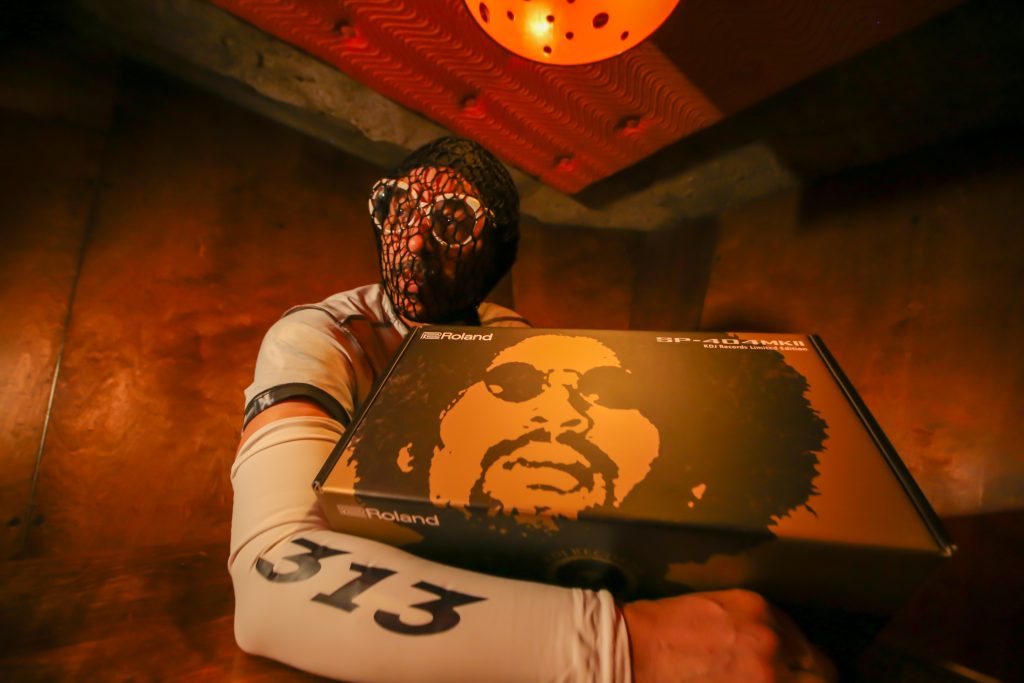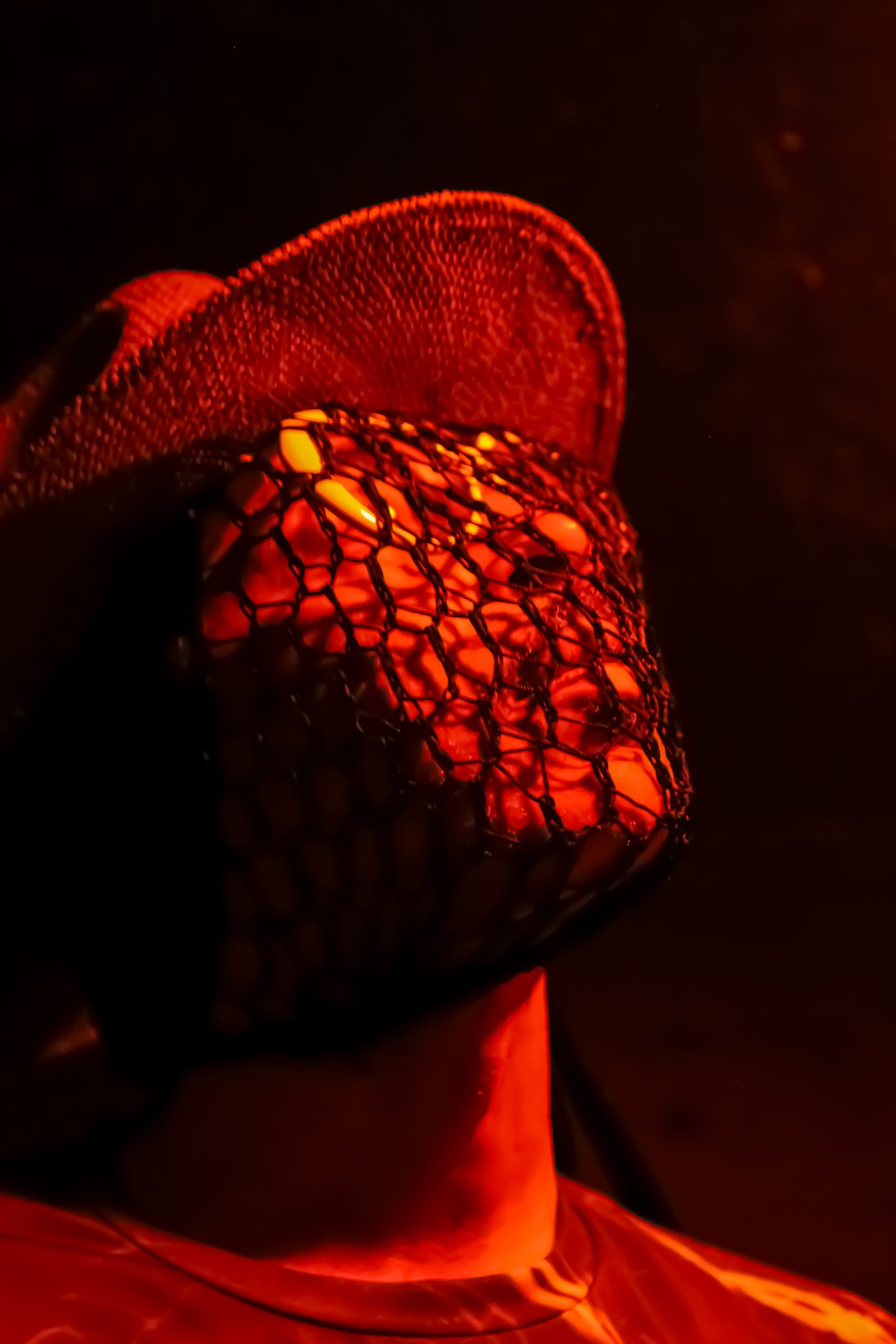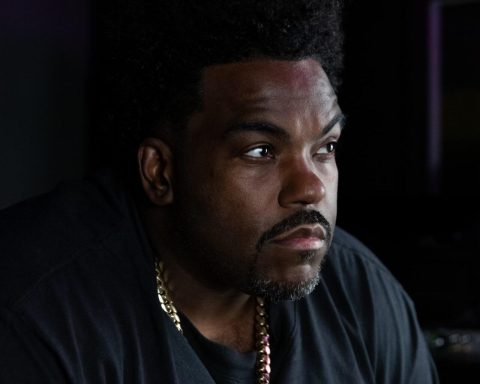It’s no exaggeration to call Moodymann the most consistently excellent dance music producer of the last quarter century. Emerging from Detroit’s prodigious and prestigious electronic music community, the man born Kenny Dixon Jr. has released a steady stream of dance floor classics since 1994, primarily on his own KDJ Records label. Despite often DJing while wearing a mask or veil, he’s become one of the most recognizable personalities in the scene, both because his face is part of the KDJ Records logo, and he appears as an animated character in an edition of the video game series Grand Theft Auto. Dig into the history of this icon of Motor City music.
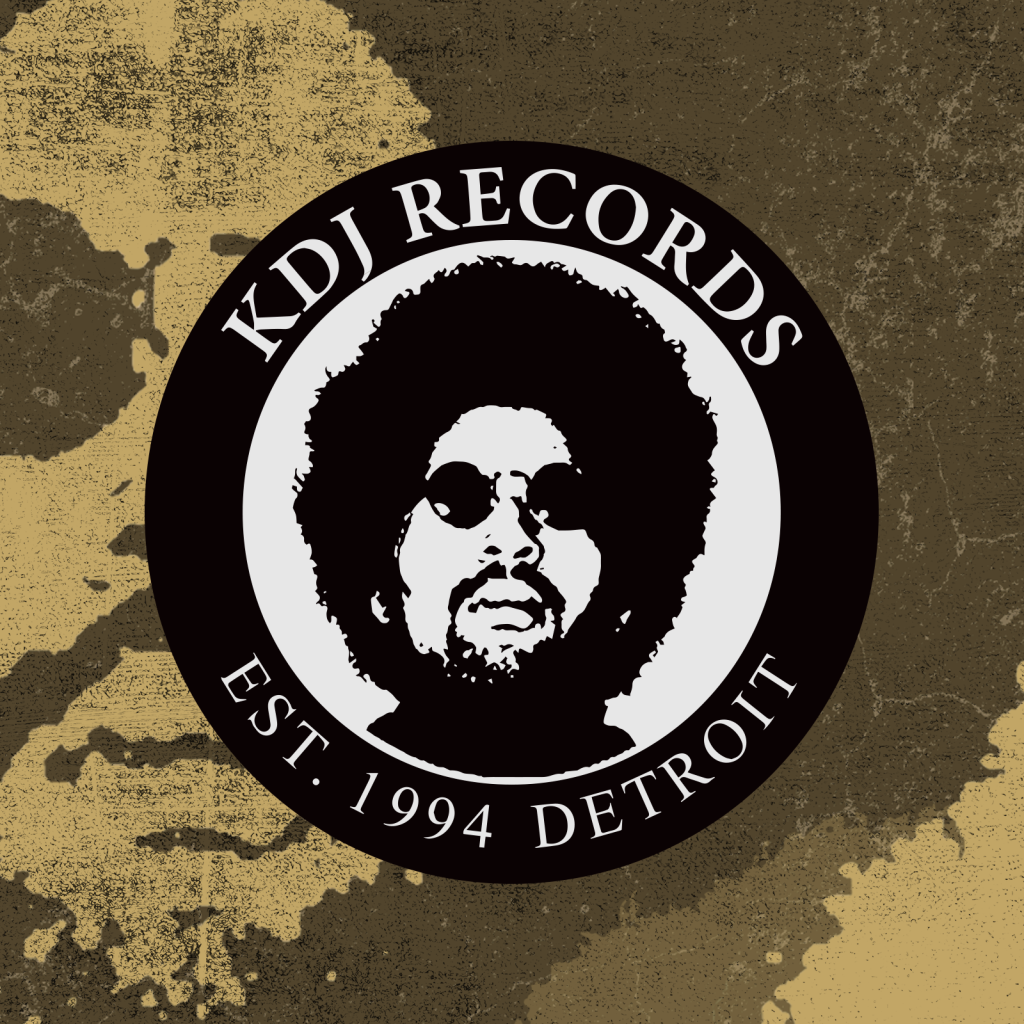
Three Chairs and a Pair of Labels
Whether using samples or live musicians, Dixon’s warm and sticky grooves are exemplary of Detroit’s vibrant house music scene, a community that includes talented producers like Theo Parrish, Rick Wilhite, and Marcellus Pittman—all of whom, along with Dixon, also make up the house supergroup Three Chairs.
KDJ introduced the initial vinyl efforts by Parrish (in 1995, with “Lake Shore Drive”) and Wilhite (in 1996, with the Soul Edge EP), as well as DJ/producer/percussionist Andrés (in 1997, with the Trues EP), but otherwise the label has largely been a vehicle for Dixon’s own work. That led him to launch a sister label in 2002: Mahogani Music, which he’s used to release the music of Detroiters like the late funk keyboard virtuoso Amp Fiddler, soul singer Monica Blaire, and electro/hip-hop MC Sheefy McFly, as well as unreleased archival material from his fellow Motor City MPC master J Dilla.
“KDJ is exactly what that is: Kenny Dixon Jr,” Dixon says. “That’s just me, all me, mine mine mine. Mahogani Music is for the rest of the world. That gives me an opportunity to reach out to other people and put them on my label.”
"KDJ is exactly what that is: Kenny Dixon Jr. That’s just me, all me, mine mine mine. Mahogani Music is for the rest of the world."
Keeping it Independent
Dixon’s first productions in the early 1990s were hip-hop tracks for pals in a local rap crew, but while Dixon appeared on their album cover photo, his name was absent from the credits. “Whoever paid for studio time was the ‘producer,’” Dixon says, “and he got all that credit. He also got all the publishing, which again we didn’t know. But that’s just how shit was back then. What the hell, we were kids.”
Dixon resolved not to repeat that experience with future productions: “This time, I want my name on it.” He also committed to keep his Black-owned business independent, and he’s leaned on a team of longtime friends as his staff.
“These are the people I grew up with,” he shares, “and I trust them. Why put some other motherfucker’s kids through college when I got my own people around me struggling, and I could take them out of that situation? They can learn how to do PR, learn how to do management, learn lawyer shit. They can read and write, they ain’t stupid. But what I can’t teach ’em is trust.”
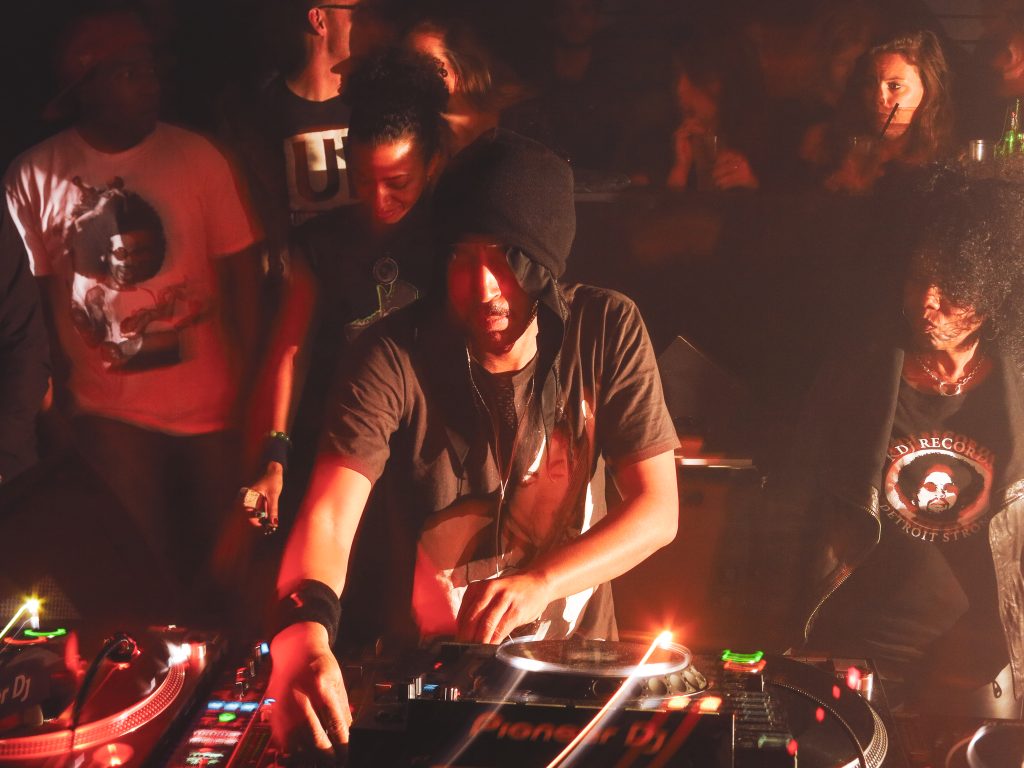
"Whoever paid for studio time was the ‘producer,’ and he got all that credit. He also got all the publishing, which again we didn't know."
Skating on Soul
The KDJ/Mahogani crew is instrumental in helping him oversee the semi-annual Soul Skate parties he throws in Detroit during Memorial Day weekend. These parties attract roller skating enthusiasts from all over the world. Over the last decade, the event has grown from a single night to an entire week of activities that offer uniquely funky counterprogramming to the yearly Movement Festival held downtown.
While KDJ Records’ origins definitely date back to 1994, exactly what constituted the label’s first release is a little murkier. Two different records have been credited as “KDJ 1”—the Moody Trax EP under Dixon’s given name and the “I Like It”/ “Emotional Content” 12-inch under the Moodymann moniker—which Dixon ascribes to a mix-up at the pressing plant.
Secrets of Scarcity
Both releases, like many of the label’s offerings, are rare and fetch high prices from collectors. Dixon insisted that such scarcity isn’t intended to goose the market. “At first, I could only afford to press up 150 records,” he says, “and now maybe I could do 3000, 4000. I just want to make sure that they sell, I don’t want nothing coming back. I gotta pay for that shipping, and that shit’s a drag. Records are expensive to make, and I don’t have a space to store this stuff.”
KDJ 6, released in 1996, features two of Dixon’s early gems. “I Can’t Kick This Feelin When It Hits” builds vocal samples from Chic’s “I Want Your Love”—“What am I gonna do, gonna do, gonna do?”—into an irresistibly exhilarating anthem of pent-up tension and cathartic release, while “Music People” borrows liberally from Mass Production’s “Welcome to Our World (Of Merry Music)” to introduce listeners to Moodymann’s distinct demimonde.
"At first, I could only afford to press up 150 records, and now maybe I could do 3000, 4000. I just want to make sure that they sell, I don't want nothing coming back."
One Big Drop
Dixon’s house tracks, like that of his fellow Detroiters, are informed as much by the high-tech soul of the Motor City’s techno scene as by disco, funk, and R&B. “Techno back in the day was a lot more soulful,” Dixon recalls. “It didn’t have to be four on the floor; that wasn’t the main focus. It was a good feeling. We didn’t have to have the run up to the ‘duhduhduhduhduh’—the whole track was beautiful.”
He feels things are different these days. “Nowadays, they want the drop, and there’s nothing wrong with that, but we had the drop at all times,” Dixon says. “We didn’t have to wait for nobody’s drop to tell us how to get down. We got down the whole motherfucking night. The whole night was one big drop.”
Initially, Dixon issued only 12-inch singles and EPs on KDJ, licensing tracks to other labels in order to compile album-length releases. His 1997 debut LP Silentintroduction, issued on Carl Craig’s Planet E label, gathered many of the early KDJ singles, creating a masterpiece that remains one of the very best records of that decade. Four albums with the UK label Peacefrog followed: 1998’s Mahogany Brown, 2000’s Forevernevermore, 2003’s Silence in the Secret Garden, and 2004’s Black Mahogani. After that, however, Dixon has kept the full-length releases primarily in-house (with exceptions for 2012’s Picture This on Scion Audio/Visual and his 2016 DJ-Kicks mix on !K7).
"Techno back in the day was a lot more soulful. It didn’t have to be four on the floor; that wasn’t the main focus. It was a good feeling."
Analog Down the Street
Dixon’s work is instantly recognizable, full of the snap, crackle, and pop of vintage vinyl and the dusty haze of old school instrumentation. “I don’t have the highest tech stuff, I’m still kind of analogging it down the street,” he explains. “I try to hide it as much as I can, but it still comes out foggy and warm, I don’t know why that is. But I still probably use some of the same equipment from the ’80s and that might be the problem, I just haven’t upgraded yet, in a lot of ways.”
Despite the supposed limitations of his gear, Dixon works in a broad range of styles and moods. “Shades of Jae,” for example, blends a 1977 London concert version of Marvin Gaye’s “Come Get to This” and a keyboard flourish from Bob James’ “Spunky” into a stuttery stomp.
There’s also the live lounge jazz vamping of “Long Hot Sex Nights” (featuring saxophonist Norma Jean Bell, the former Frank Zappa side musician who’s a frequent Dixon collaborator); the funked-up fusion of “Technology Stole My Vinyl”; the minimal acid of “Dem Young Sconies”; the stirring gospel of “The Thief Who Stole My Sad Days … Ya Blessin’ Me”; and the rootsy grind of “Sunday Hotel,” which samples OG bluesman Muddy Waters.
"I don’t have the highest tech stuff, I’m still kind of analogging it down the street."
Purple Influence
Then, of course, there’s the influence of Dixon’s main inspiration, Prince Rogers Nelson. The infamous “Freeki Mutha F cker” is Dixon’s most overtly purple composition. Pressed initially as a white label in 2003, it wasn’t officially released until 2011 but was always a much-requested concert staple. Before his live set at the 2007 Movement Festival, Dixon was warned not to perform “Freeki Mutha F cker” by Detroit police, who were apparently worried the louche language would transform the Motor City into Erotic City.
With the show running way behind schedule because of weather issues and technical difficulties, Dixon got the word that he only had time to perform one more song, so he scrapped the planned setlist and played “Freeki Mutha F cker” anyway. “I just looked up, and they were on the stage,” says Dixon of the cops, “ready for me, on the left side and the right side. But no one was behind me, so I ran off the stage behind me.” He then jumped into a waiting car and sped away down Jefferson Avenue into the night.
In keeping with his love for Prince, Dixon’s albums of the past 15 years or so—most notably 2014’s Moodymann, 2018’s Sinner, and 2020’s Taken Away—feature his own vocals prominently, with the music often performed live by backing musicians. While this might appear to be an evolution from his sample-based work, Dixon maintains that his process hasn’t radically changed. He says he uses his sampler just as much as ever—often as a form of relaxation—it’s just that it’s worked out that he’s released more of the “liver feel” tracks.
"I just looked up and they were on the stage ready for me, on the left side and the right side. But no one was behind me, so I ran off the stage behind me."
The Golden Ticket
Dixon rarely re-presses his KDJ releases—when they’re gone, they’re gone, because by the time they’re out, he’s mentally moved on to the next one—but the few times he has, he sometimes includes different tracks on the new editions (like with the reissue of 1995’s Inspirations From a Small Black Church on the Eastside of Detroit EP) which only heightens the confusion—and demand—among collectors. Sometimes, he’ll even slip an unreleased white label 12” inside an album, just for kicks, gifting the buyer with the vinyl version of Willy Wonka’s Golden Ticket.
The label remains a must-purchase-on-sight brand, though the hunt to actually corner a copy seems to get more and more difficult. Sinner, for example, was basically only available at a BBQ held in Dixon’s backyard, while an entire untitled 2018 album, featuring a guest appearance from Snoop Dogg, never even made it out of the label offices; to get a copy, you need to be personally handed one by Dixon himself. The median sale price for it on Discogs? $500.00.
Dixon explains that this latter-day holy grail was actually a scuttled effort. By the time the record was pressing white labels, he had totally soured on how it sounded. “I hated it,” he admits, “that’s the brutal truth.” But by then the record had already been pressed and packaged, leaving him with boxes and boxes of unwanted units. “What am I gonna do with ’em?” Dixon says. “I still got ’em sitting around and just randomly give ’em out.”
"A lot of people spend so much time learning their craft instead of actually doing the craft. But I'd rather spend my time enjoying it than learning every new thing that comes out."
Slow Down for the Craft
Thirty years on from KDJ’s launch, Dixon shows no signs of slowing down (despite his 2020 album Taken Away featuring a sultry jam entitled just that: “Slow Down”). He credits his longevity to his personal philosophy.
“A lot of people spend so much time learning their craft instead of actually doing the craft,” Dixon says. “Because the new technology comes out so fast and everybody wants to hop on the new. Hop on the new, you don’t really get the chance to do your artwork, because you’re learning. Well sometimes I don’t want to learn, I just want to produce. I don’t have time to learn this new shit that’s sitting on the table. Fuck all that. I want to get down. I’d rather spend my time enjoying it than learning every new thing that comes out.”
